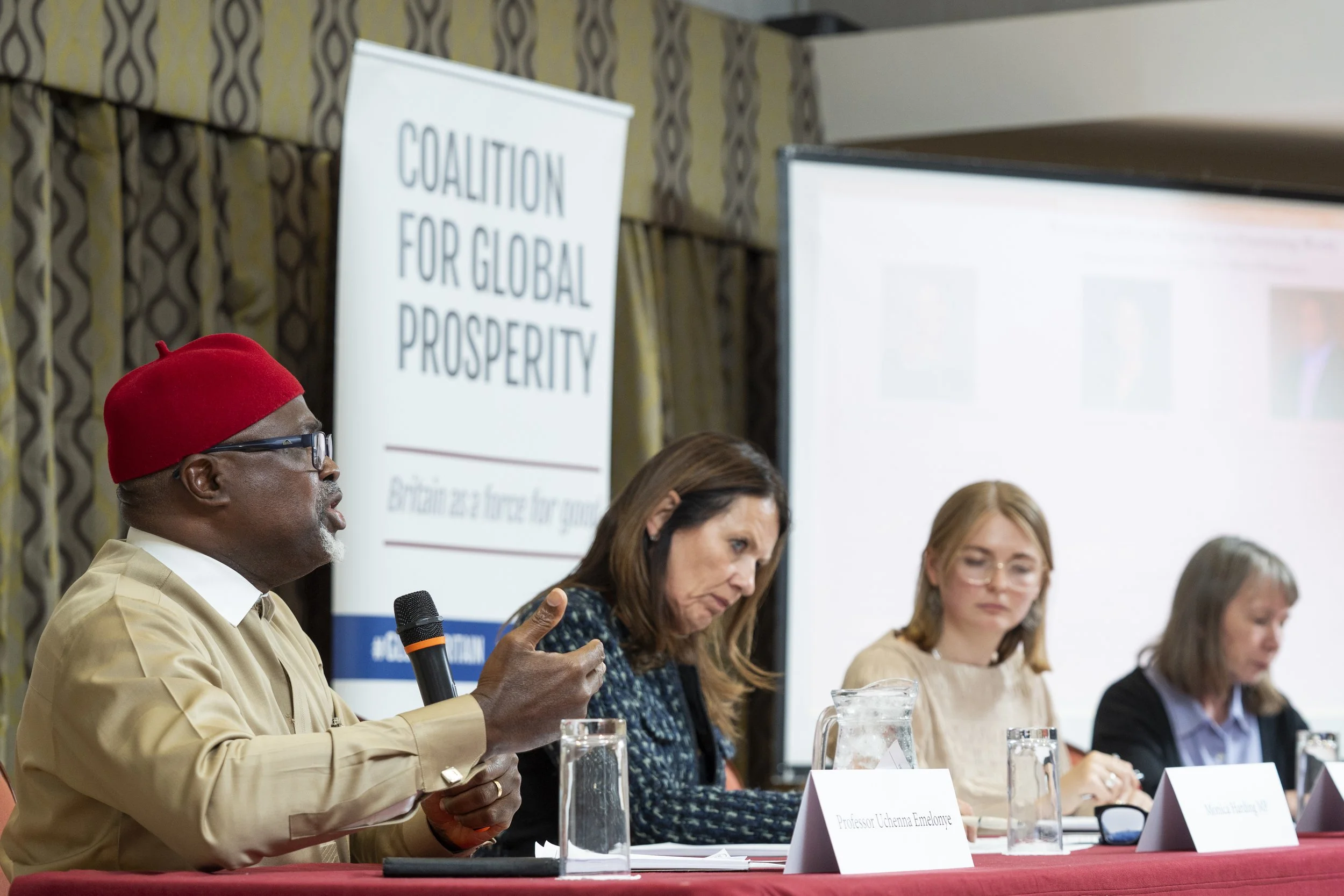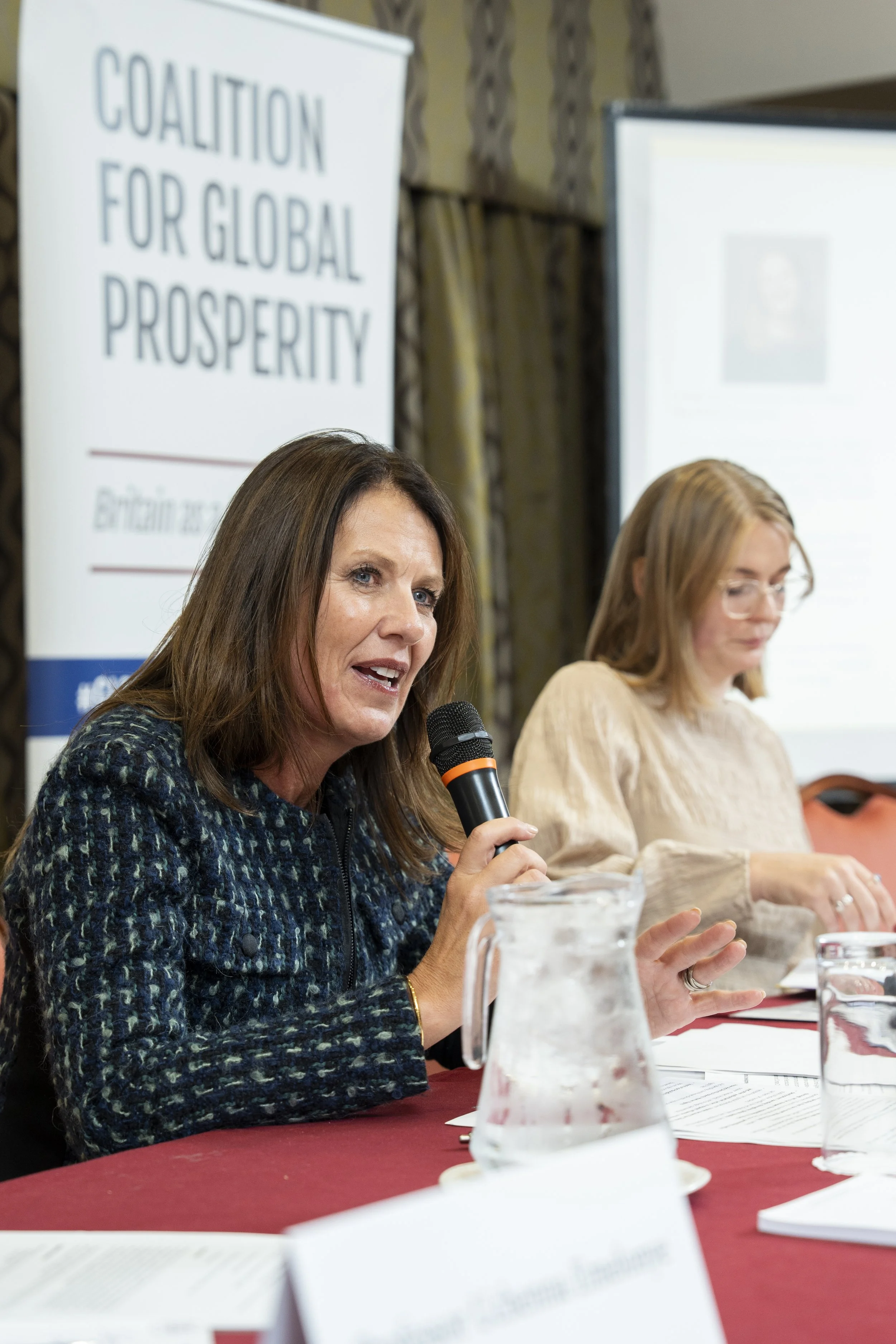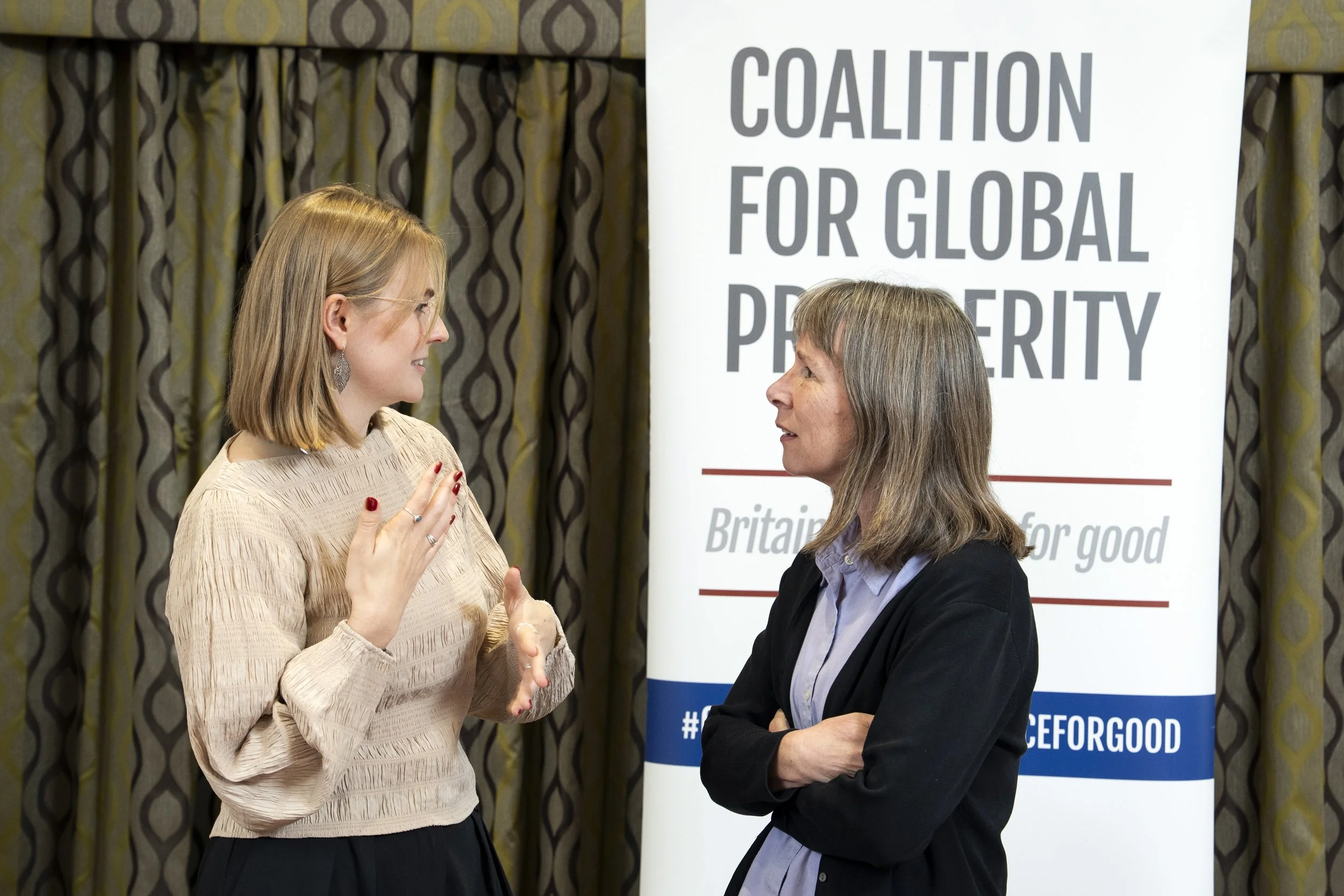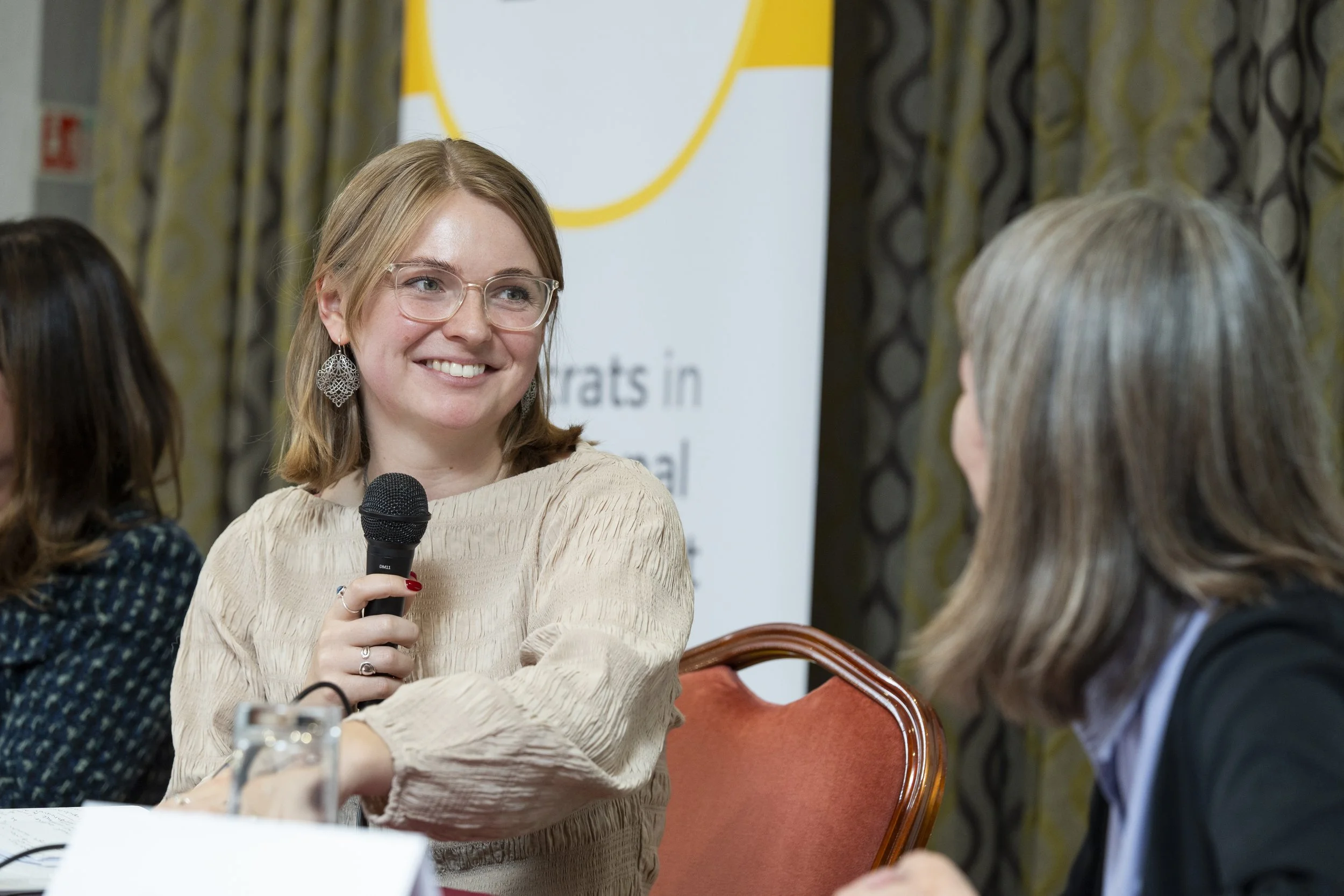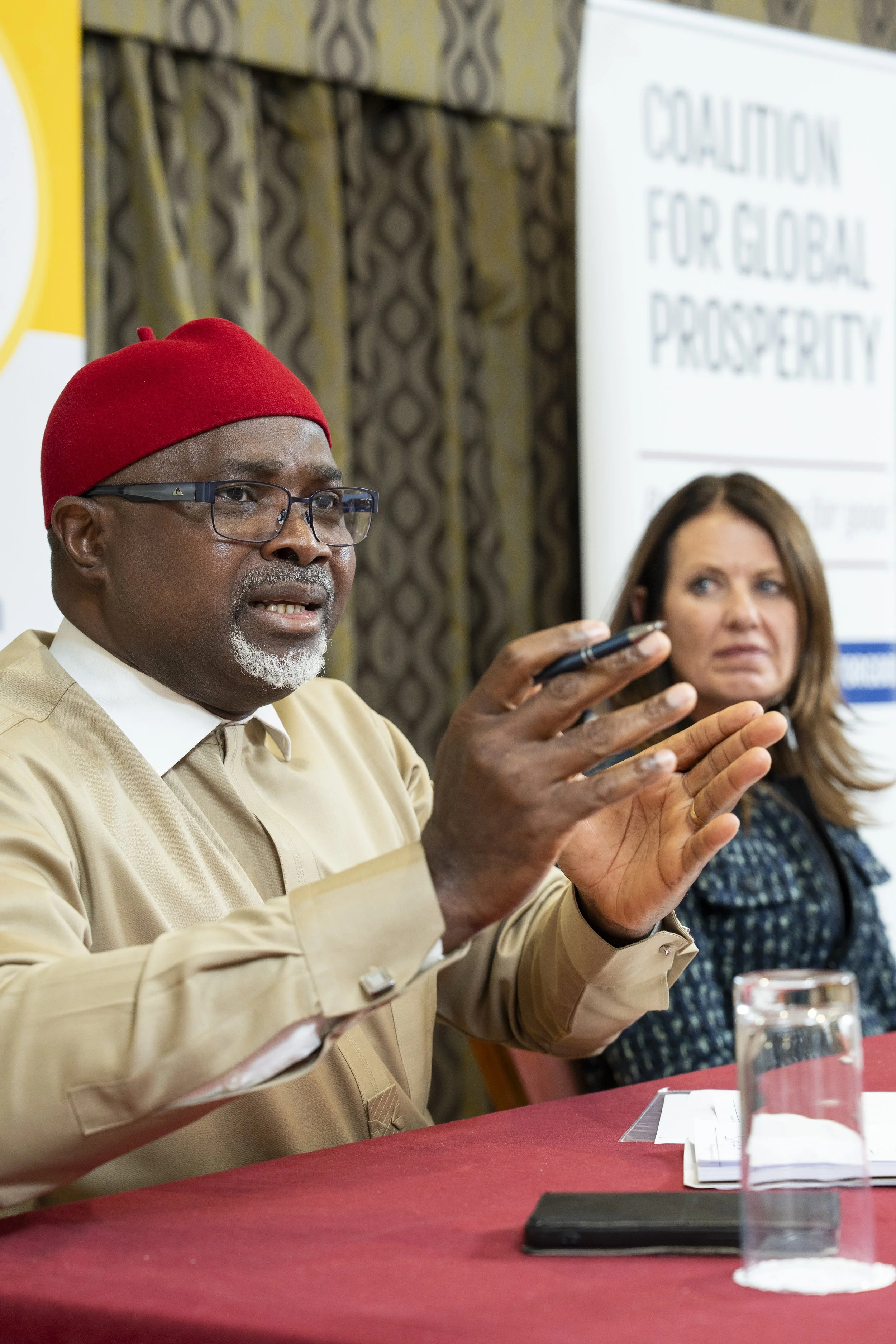CGP at Lib Dem Conference 2025
‘Protecting Human Rights in a Fracturing World’ at Liberal Democrat Party Conference 2025, hosted by the Coalition for Global Prosperity and Liberal Democrats in Development
On Sunday 21st September at Liberal Democrat Party Conference, the Coalition for Global Prosperity (CGP) and Liberal Democrats in International Development (LDID) hosted a panel discussion to focus on how international development continues to have a focus on protecting human rights at a time where other pressing geopolitical issues dominate the agenda. There were various NGO stakeholders in attendance, and the session was chaired by our Senior Researcher, Zoe Swanwick.
Key themes that were covered in the discussion were:
Communication of international development to the general public
Soft power
Financing development
Children in education
The discussion explored how the UK can utilise its expertise to promote the protection of human rights in the global arena, alongside listening to the concerns of prominent multilateral institutions and civil society organisations when considering how nations hold each other to account amidst humanitarian crises. The discussion was opened with Monica Harding MP noting that this year has been an incredibly deadly year of conflict with 120 armed conflicts taking place to date. This has led to the deaths of multiple civilians with women and children most directly affected. Additionally the loss of aid workers tending to these conflicts has been stark. It was noted that the UK has the ability to lead due to its reputation of being a diplomatic powerhouse and natural convener between states, but it requires consistency in its application of international law - something which has thus far been lacking. It was also outlined that both defence and development are mutually reinforcing, therefore the Government’s decision to slash the aid budget, will only further diminish our soft power and security in the long term.
The conversation expanded further on the detrimental impact that the UK aid cuts will have, enhanced by a recent case study from Ginny Baumann, who remarked on her recent experience in Karamoja, Uganda where she visited programmes supported by the Freedom Fund. She emphasised in her remarks that geopolitical factors such as funding cuts and the climate crisis push children into child labour pipelines, a circumstance which could be alleviated if there was an improved response from governments and multilateral organisations alike to prioritise the wellbeing of children within the Global South. Further to this, Professor Uchenna Emelonye highlighted that multilateral cooperation is just as important now as it was in 1945. However, when organs of the UN, such as the UNSC, malfunction, geopolitical interests of nation states override the ability of multilaterals to protect human rights.
The discussion deepened into the application of diplomatic tools to ensure human rights continue to be protected as the war in Gaza was addressed. There was further consensus that the decision to uplift defence spending in favour of development spending was one of haste, which will have costly consequences for both defence and development. All panellists rejected the notion that defence and development are competing priorities; they are two sides of the same coin. Following this, Professor Uchenna Emelonye emphasised that governments focus on some rights more than others, which results in large disparities between which human rights are protected and to what extent. Ginny Baumann also noted that it is the most basic of human rights that are directly affected by the climate crisis; and the global definition of human rights needs to be expanded to consider the effect of the climate crisis on human rights. The link between child labour and climate presents itself in two forms: either, children are denied basic rights such as food or water due to climate-affected conditions or, children are recruited into climate disrupting industries such as rainforest demolition.
The Q&A section expanded upon how the aid cuts have greatly affected the UK’s soft power, in addition to this, how the Liberal Democrats can protect the legacy and expertise held in the former Department for International Development - at the time recognised as one of the most effective and impactful government development agencies in the world. The panel agreed that following the cuts, the most impactful next step for the government is to ensure that the value-for-money of the development spending is clearly laid out for the taxpayer. This raised the importance of language at a time where rising conflicts and uncertainty around migration has captured the taxpayer’s attention and the need to use more “muscular” language. The conversation followed on to how global finances can be ratified by multilateral organisations such as the UN to ensure that funds are allocated effectively, ensuring that the world’s most vulnerable receive the correct support. It was suggested that the current system where funds can be “earmarked” by donors depending on their preferences may undermine impactful development since it does not always align with developing country priorities.
The conversation also addressed how the aid cuts globally will affect children in education, in which Monica Harding MP outlined that a priority for the Liberal Democrats is the safeguarding of women and children globally, as looking after a mother is a pre-requisite for a child’s health and wellbeing.
To conclude ,the audience were asked to consider how Liberal Democrats can move from a reactive position to a proactive stance on defending liberal values of human rights at a time when those basic principles –and the post-war institutions set up to protect them– are under attack.
Private Dinner at the Liberal Democrat Party Conference hosted by the Coalition for Global Prosperity
On Monday 22nd September the Coalition for Global Prosperity hosted a private dinner at Liberal Democrat Party Conference titled Rethinking Global Leadership: Defence, Development and Diplomacy. This dinner gave Liberal Democrat parliamentarians and policymakers the opportunity to discuss a Liberal vision for international development as a key pillar of British foreign policy.
Key themes that were discussed include:
British values and regaining public trust
UK leadership
Bilateral relations with African countries
Economic partnerships and new ways to finance development
The dinner opened with an exploration from the attendees on the efficacy of aid, especially within the context of aid cuts announced by the Government earlier this year. It was acknowledged that value-for-money must be effectively communicated to the taxpayer in order to regain public support for international development. It was also noted that domestic priorities, such as migration, have resulted in a decline in support for international development.
The conversation swiftly moved onto discussing the youth vote within the general election and beyond. The party has seen substantial support from young people, with young voters understanding the strategic and moral case for international development.
Following this, the conversation transitioned onto the argument to be made for defence, development and diplomacy as a collaborative concept rather than three separate elements. The discussion expanded upon the remarks made by The Lord Dannatt GCB CBE MC, former Chief of the General Staff, on the importance of defence and development as complementing tools of diplomacy, especially in areas such as post-conflict resolution.
It was then highlighted that the issue with obtaining public support is further undermined by the lack of political leadership. There was a consensus that the lack of political leadership on international development has resulted in limited accountability from Government ministers on the detrimental impact of development cuts. Further to this, it was queried how the UK can raise awareness for all humanitarian disasters taking place globally, outside of Ukraine, Sudan and Gaza.
The conversation then extended to bilateral partnerships within Africa. Within this element of the discussion, the attendees came to a consensus that the UK first must prioritise strengthening diplomatic relations if we are able to establish or expand upon business relations. This has been undermined by the lack of consistency in ministerial positions: No Minister for Africa has ever lasted in the position for over a year since 2014. Again, there was group consensus that strengthening economies is mutually beneficial for both the UK and African economies, which in turn, navigate the threat of bad actors such as China pursuing policies that leave countries in ‘debt traps’.
When supporting African development, attendees outlined practical and impactful steps. First, mobilising greater levels of private finance to the Global South, especially those most likely to be impacted by climate change. For years, it has been much harder to mobilise private finance due to decreasing effectiveness of government and the backsliding of institutions. Second, tackling illicit financial flows is a priority. Failure in this risks undermining development, regardless of the amount spent through ODA. The UK’s, and especially London’s, centrality in global financial and regulatory markets puts the UK in a unique position to drive change on both of these priorities.
The dinner closed with all attendees acknowledging the effective work that is being done in international development while highlighting that there is still further to go. With the ever increasing threat of Reform UK to liberal values, the Liberal Democrat Party is committed to being a credible opposition to Labour in place of the Conservative Party.
While the commitment to spending 0.7% of GNI on international development remains a core policy for the Liberal Democrats, immediate priorities for holding the Government to account include bilateral relations with African countries, and issues around the protection of women and girls, education and nutrition.

